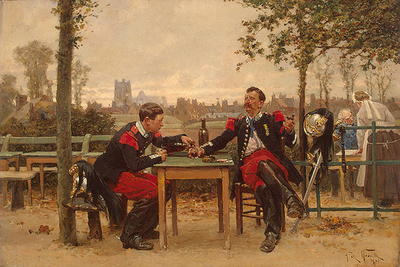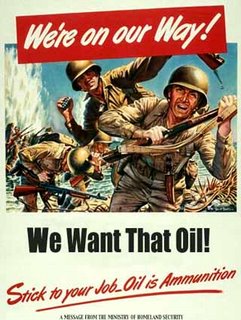
The painting is called Regaling the Commander, and was created by Alphonse-Marie-Adolphe de Neuville in 1875.
On a grass leaf, awaiting the morning sun,
The dew is melting.
Do not stir the field so soon, wind of winter!
---Dogen
Tozan asked Sozan: "Where are you going?"
"To an unchanging place," Sozan said.
"If it's unchanging, how could there be any going?" asked Tozan.
Sozan said: "Going, too, is unchanging."
---Zen mondo
When we are mired in the relative world, never lifting our gaze to the mystery, our life is stunted, incomplete; we are filled with yearning for that paradise that is lost when, as young children, we replace with words and ideas and abstractions---such as merit, such as past, present and future---our direct, spontaneous experience of the thing itself, in the beauty and precision of this present moment.
---Peter Matthiessen
I understand an element of basic military training stays with you forever. I work with a guy who saw action as a Marine Corps sergeant in Viet Nam some 35 years go. He likes to snap me a salute in the school hallway, partly out of respect I guess but also to show off his machismo. The whole military thing is such a definition of manhood that a guy actually can feel discomfort for having gone through adolescence in relative Peacetime, as my generation did. I made it all the way through with a 1-A classification, but never was drafted---although the Cuban Missile Crisis came close.
No such problems of Peacetime nowdays though...or in the forseeable future, with eternal war declared on any opposition to Yankee globalization. Even our army supposedly has a private army of contracted protectors...although they don't seem as efficient at doing that job as they do guarding scouts for various corporations. Reagan was not a real soldier but he played one in the movies. Nixon got off on splendid uniforms. Bush and Cheney ducked duty but work ceaselessly to convince the world they're true commanders of democracy. They so love their armed contractors in Iraq and New Orleans (was NO or Katrina mentioned in the State of the Union?) that we now are hearing proposals for a new private army in the US to do all those pesky menial chores that so plague the luxury class.
As Bush looks for more people to command, which of course is the mark of a Real Man, I'm relieved to get a history lesson from Garry Wills today in the NY Times. He reviews for us what Commander in Chief really means in historical and Constitutional context. This White House seems to care little for either history or the Constitution, but the rest of us can benefit from a little review. Garry Wills, a professor emeritus of history at Northwestern, is the author, most recently, of “What Paul Meant.”
The New York Times
January 27, 2007
Op-Ed ContributorAt Ease, Mr. President
By GARRY WILLS
We hear constantly now about “our commander in chief.” The word has become a synonym for “president.” It is said that we “elect a commander in chief.” It is asked whether this or that candidate is “worthy to be our commander in chief.”
But the president is not our commander in chief.
He certainly is not mine. I am not in the Army.
I first cringed at the misuse in 1973, during the “Saturday Night Massacre” (as it was called). President Richard Nixon, angered at the Watergate inquiry being conducted by the special prosecutor Archibald Cox, dispatched his chief of staff, Al Haig, to arrange for Mr. Cox’s firing. Mr. Haig told the attorney general, Elliot Richardson, to dismiss Mr. Cox. Mr. Richardson refused, and resigned. Then Mr. Haig told the second in line at the Justice Department, William Ruckelshaus, to fire Cox. Mr. Ruckelshaus refused, and accepted his dismissal. The third in line, Robert Bork, finally did the deed.
What struck me was what Mr. Haig told Mr. Ruckelshaus, “You know what it means when an order comes down from the commander in chief and a member of his team cannot execute it.” This was as great a constitutional faux pas as Mr. Haig’s later claim, when President Reagan was wounded, that “Constitutionally ... I’m in control.”
President Nixon was not Mr. Ruckelshaus’s commander in chief. The president is not the commander in chief of civilians. He is not even commander in chief of National Guard troops unless and until they are federalized. The Constitution is clear on this: “The president shall be commander in chief of the Army and Navy of the United States, and of the militia of the several states, when called into the actual service of the United States.”
When Abraham Lincoln took actions based on military considerations, he gave himself the proper title, “commander in chief of the Army and Navy of the United States.” That title is rarely — more like never — heard today. It is just “commander in chief,” or even “commander in chief of the United States.” This reflects the increasing militarization of our politics. The citizenry at large is now thought of as under military discipline. In wartime, it is true, people submit to the national leadership more than in peacetime. The executive branch takes actions in secret, unaccountable to the electorate, to hide its moves from the enemy and protect national secrets. Constitutional shortcuts are taken “for the duration.” But those impositions are removed when normal life returns.
But we have not seen normal life in 66 years. The wartime discipline imposed in 1941 has never been lifted, and “the duration” has become the norm. World War II melded into the cold war, with greater secrecy than ever — more classified information, tougher security clearances. And now the cold war has modulated into the war on terrorism.
There has never been an executive branch more fetishistic about secrecy than the Bush-Cheney one. The secrecy has been used to throw a veil over detentions, “renditions,” suspension of the Geneva Conventions and of habeas corpus, torture and warrantless wiretaps. We hear again the refrain so common in the other wars — If you knew what we know, you would see how justified all our actions are.
But we can never know what they know. We do not have sufficient clearance.
When Adm. William Crowe, the former chairman of the Joint Chiefs of Staff, criticized the gulf war under the first President Bush, Secretary of State James Baker said that the admiral was not qualified to speak on the matter since he no longer had the clearance to read classified reports. If he is not qualified, then no ordinary citizen is. We must simply trust our lords and obey the commander in chief.
The glorification of the president as a war leader is registered in numerous and substantial executive aggrandizements; but it is symbolized in other ways that, while small in themselves, dispose the citizenry to accept those aggrandizements. We are reminded, for instance, of the expanded commander in chief status every time a modern president gets off the White House helicopter and returns the salute of marines.
That is an innovation that was begun by Ronald Reagan. Dwight Eisenhower, a real general, knew that the salute is for the uniform, and as president he was not wearing one. An exchange of salutes was out of order. (George Bush came as close as he could to wearing a uniform while president when he landed on the telegenic aircraft carrier in an Air Force flight jacket).
We used to take pride in civilian leadership of the military under the Constitution, a principle that George Washington embraced when he avoided military symbols at Mount Vernon. We are not led — or were not in the past — by caudillos.
Senator Daniel Patrick Moynihan’s prescient last book, “Secrecy,” traced the ever-faster-growing secrecy of our government and said that it strikes at the very essence of democracy — accountability of representatives to the people. How can the people hold their representatives to account if they are denied knowledge of what they are doing? Wartime and war analogies are embraced because these justify the secrecy. The representative is accountable to citizens. Soldiers are accountable to their officer. The dynamics are different, and to blend them is to undermine the basic principles of our Constitution.
Copyright 2007 The New York Times Company http://www.nytimes.com/2007/01/27/opinion/27wills.html?th&emc=th

